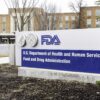A new study is again raising questions about the safety of silicone breast implants, though the FDA has come out and said it disagrees with its conclusions.
Researchers at MD Anderson Cancer Center in Houston looked at data on about 100,000 women that had received silicone breast implants. The data came from post-marketing studies that the only 2 manufacturers of silicone implants were required to conduct after the devices were approved in 2006.
Results, published in the journal Annals of Surgery, found that women that received breast implants had an increased risk of autoimmune disorders, stillbirth and melanoma compared to women in the general population. Women with the implants had a 6 times higher risk of developing rheumatoid arthritis, a 4.5-fold increase in risk of stillbirth and a 4 times higher risk of melanoma, a skin cancer.
Silicone implants were also associated with a higher risk of surgical complications compared to saline implants.
In an editorial response, Binita S. Ashar, MD, director of the FDA’s Division of Surgical Devices, wrote that the agency disagreed with the study’s conclusions, noting concerns with methodology.
Ashar also announced that the FDA will hold a public meeting next year on breast implant safety.
Silicone implants were initially banned in 1992 amid safety concerns. In March, the FDA said it was “working to update and enhance information” on a potential association between breast implants and a type of lymphoma.





